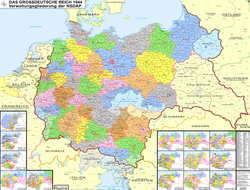Reichsgau Wien
| Reichsgau Wien | ||||||
| Reichsgau of Nazi Germany | ||||||
|
||||||
|
||||||
|
Map of Nazi Germany showing its administrative subdivisions (Gaue and Reichsgaue). |
||||||
| Capital | Vienna | |||||
| Gauleiter | ||||||
| • | 1938–1939 | Odilo Globocnik | ||||
| • | 1939–1940 | Joseph Bürckel | ||||
| • | 1940–1945 | Baldur von Schirach | ||||
| History | ||||||
| • | Anschluss | 12 March 1938 | ||||
| • | German surrender | 8 May 1945 | ||||
| Population | ||||||
| • | 1939 | 1,920,390 | ||||
| Today part of |
|
|||||
The Reichsgau Wien (English: Gau Vienna) was an administrative division of Nazi Germany based in Vienna, Austria. It existed between 1938 and 1945. Parts of Lower Austria were annexed to establish Greater Vienna, which then became the biggest city of Nazi Germany by area.
The Nazi Gau (plural Gaue) system was originally established in a party conference on 22 May 1926, in order to improve administration of the party structure. From 1933 onwards, after the Nazi seizure of power, the Gaue increasingly replaced the German states as administrative subdivisions in Germany. In March 1938 Nazi Germany annexed Austria, with the latter being sub-divided into Reichsgaue.
At the head of each Gau stood a Gauleiter, a position which became increasingly more powerful, especially after the outbreak of the Second World War. Local Gauleiter were in charge of propaganda and surveillance and, from September 1944 onwards, the Volkssturm and the defence of the Gau.
The position of Gauleiter in Wien was initially held by Odilo Globocnik from 1938 to 1939, by Josef Bürckel from 1939 to 1940 and by Baldur von Schirach for the remainder of the Reichsgau's history up to 1945.
...
Wikipedia



